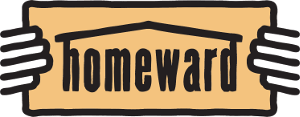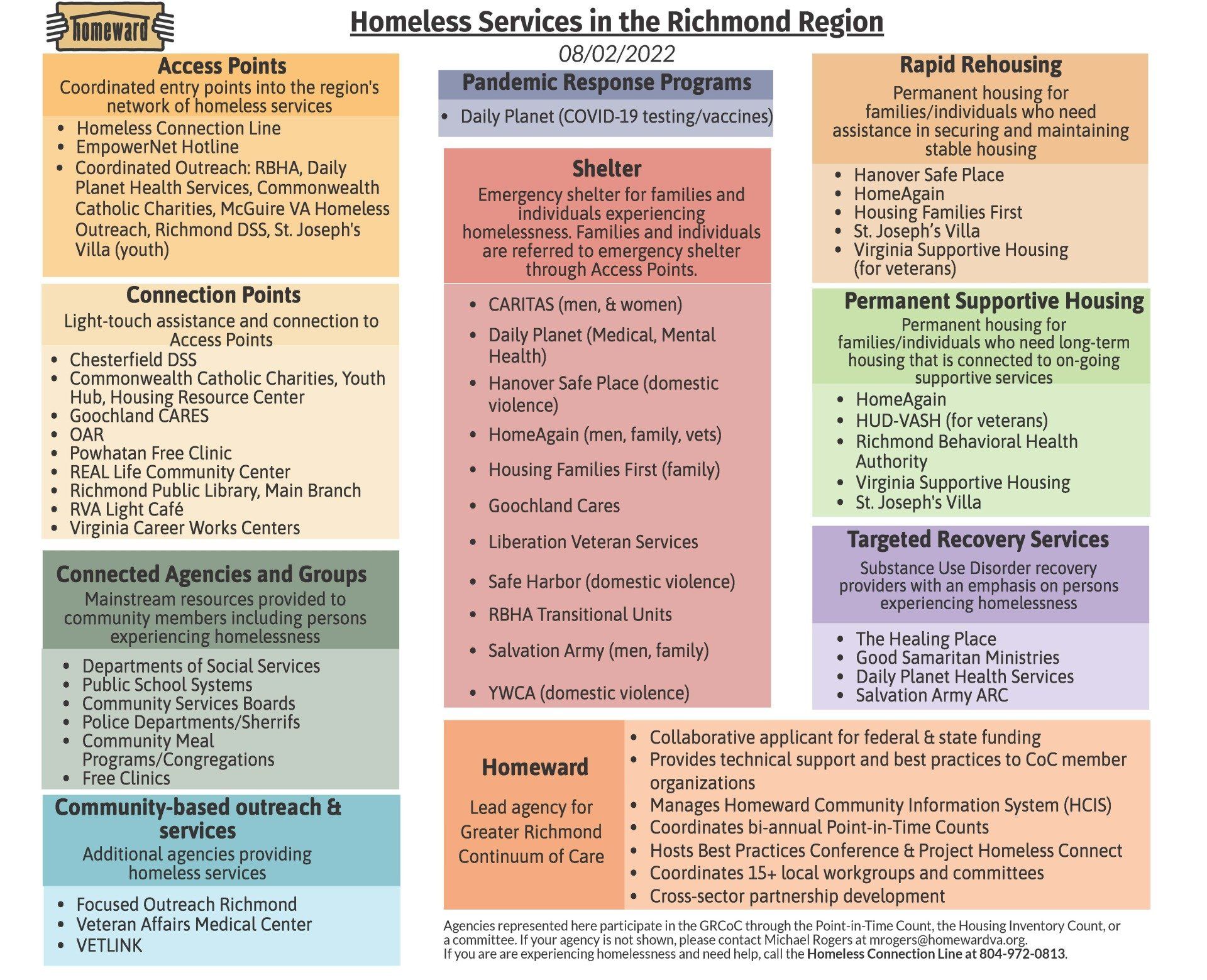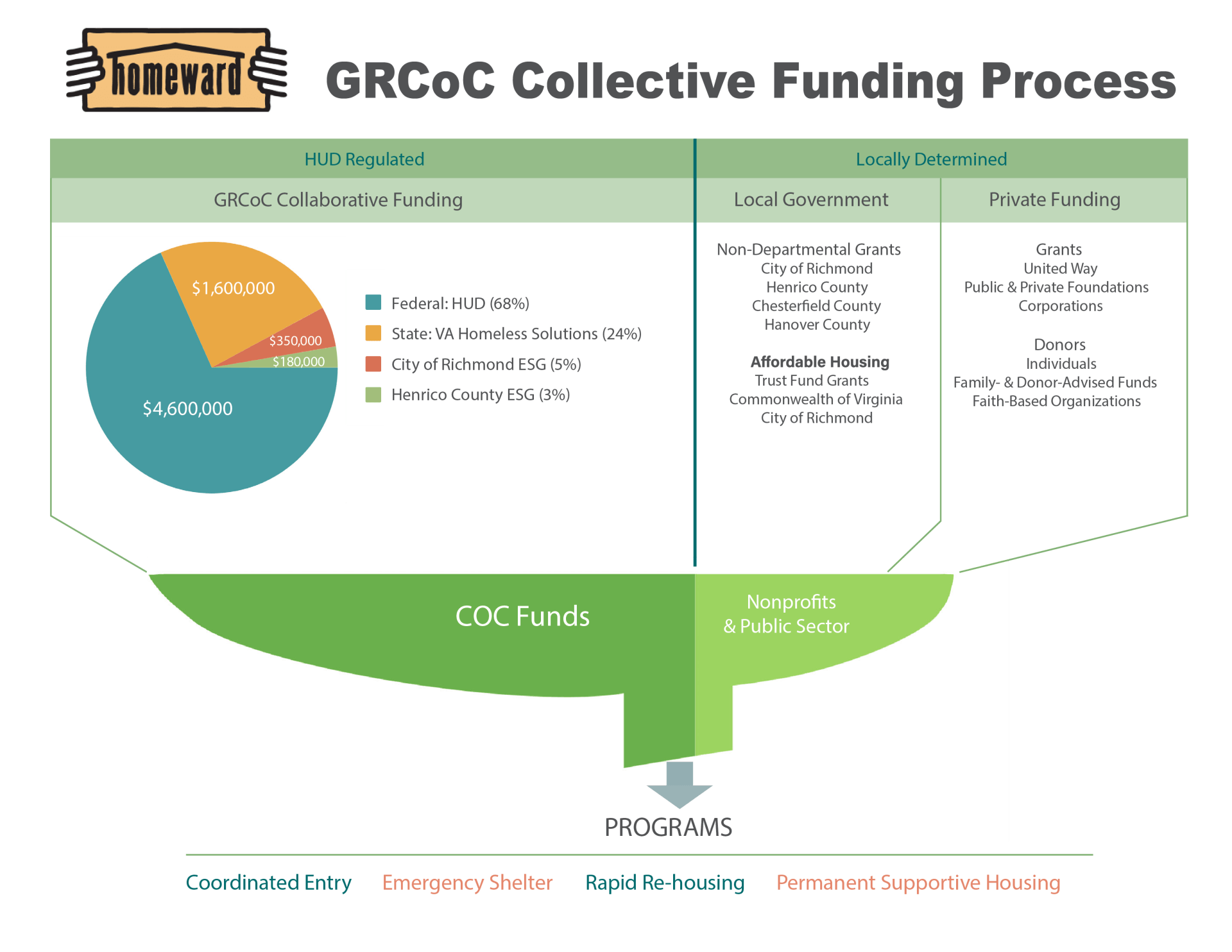How We Work
Systems Map
Homeward coordinates and facilitates collaboration among agencies to ensure successful planning and a collaborative homeless services system serving those experiencing or at risk of homelessness in the Greater Richmond region (City of Richmond, Town of Ashland, and Counties of Charles City, Chesterfield, Goochland, Hanover, Henrico, New Kent, and Powhatan.) Staff work with more than 30 community partners to provide subject matter expertise and guidance, technical competency, and administrative support for community coalitions and workgroups working to prevent and end homelessness.
Homeward vs. the GRCoC
Homeward is a distinct organization from the Greater Richmond Continuum of Care (GRCoC), which is a collective effort among homeless service providers in the Richmond region to coordinate their work. Homeward provides support to nonprofits and public sector agencies that participate in the GRCoC. Homeward’s research, data collection and analysis, planning, policy work, and technical assistance empower GRCoC partner agencies to help more people.
How Homeward Functions in the GRCoC
Homeward and the GRCoC have written agreements reviewed annually for our role as:
- HMIS Lead: Identifying needs and trends through data collection, providing required reporting, and meeting funder requirements
- Collaborative Applicant: Facilitating coordinated funding applications for public funds
- Coordinated Entry System Administrator: System coordination and support for Coordinated Entry programs (Homeless Connection Line)
In these roles, we provide
- Community and partner engagement, including collective trainings and information sessions
- Technical assistance and capacity-building for the homelessness services network
- Planning and policy support through planning and working committees
Funding Map
- Homeward secures funding from a variety of sources, including private donors and public sources.
- The single largest funder of homeless services is the U.S. Department of Housing and Urban Development (HUD) Special Needs Assistance Program.
- Other major public funders include the Virginia Department of Housing and Community Development, the City of Richmond, Henrico County, and Chesterfield County.
- The majority of funding for homeless services in the Richmond region comes as a result of private fundraising from individuals, foundations, congregations, corporations, and other sources.
FAQS
Got questions? We’ve got answers.
How Homeward Works
-
What is Homeward?
- Homeward exists because the U.S. Department of Housing and Urban Development (HUD) requires all localities, including the Richmond region, to have an organization that coordinates and tracks homeless services in order to receive public funding.
- Homeward was established in 1998 so our region would qualify for HUD funding. We support the work of nonprofits and local governments addressing homelessness in Greater Richmond.
- Homeward is an active participant in the national network of partners to reduce homelessness and considered a model by other communities.
- Homeward is considered a national leader in data analysis and developing solutions to address homelessnesse. The organization was honored with the 2021 Best Regional Partnership Award at the Governor's Housing Conference for Homeward's leadership during the pandemic.
-
What does Homeward do?
- Homeward helps local homeless service providers in the Richmond region better plan and collaborate.
- Think of Homeward as an air traffic control tower that monitors progress, ensures our partners have the support they need, advocates for homeless service policies, and plans for future needs.
- Homeward also collects all HUD required information and analyzes that data to report results, share best practices, and make it possible for our partners to focus on providing services that have a bigger impact.
- Homeward is frequently highlighted as a national model for collaboration. The Urban Institute published a case study about the Richmond region's response to the pandemic and Homeard's role.
-
Does Homeward manage any shelter programs?
No, Homeward does not currently manage any shelter programs and will not manage shelters in the future. From March 2020 – July 2021, Homeward did manage the Richmond region’s Emergency Pandemic Shelter. At the time, Homeward was the only organization that could step in to launch and manage this critical program that provided safe, indoor accommodations for individuals and families at risk during the COVID-19 pandemic. In August 2021, our region’s pandemic response transitioned to a new phase with the creation of a Pandemic Recovery Shetler. This transition was based on protocol developed by community members and approved by the Greater Richmond Continuum of Care Board of Directors. As of August 1, 2021, Commonwealth Catholic Charities (CCC) has managed the non-congregate Pandemic Recovery Shelter for the Richmond region.
-
Does Homeward take clothing or food donations?
Since Homeward is not a direct service provider, we generally do not have the capacity to accept donations of food, clothing, shelter kits, or personal hygene items. Please contact your local food pantry or shelter programs for guidance.
-
What is the Greater Richmond Continuum of Care and is it a part of Homeward?
- The Greater Richmond Continuum of Care (GRCoC) is not a part of Homeward.
- It is a collective effort among homeless service providers in Greater Richmond to coordinate their work. Homeward provides support to nonprofits and public sector agencies that participate in the GRCoC.
- The GRCoC is considered a national model for cooperation and collaboration as well as relying on data and lived experiences to inform solutions.
- Homeward and all GRCoC partner agencies prioritize the dignity and autonomy of every person, including those experiencing homelessness. If someone declines assistance, we respect their wishes but will continue to follow up with them so they know resources are available. We never stop offering help.
-
Where does Homeward get its information?
- For more than two decades, Homeward has studied homelessness by engaging in conversations with people living outdoors or in shelters to better understand programs and solutions for those experiencing homelessness.
- Homeward uses both qualitative and quantitative research that includes extensive interviews with individuals experiencing homelessness to learn about their needs.
- Homeward has a lengthy and proven track record of sharing accurate and verifiable data on what works and best practices to serve our most vulnerable neighbors.
-
What information do you share about shelter residents?
- Homeward and our shelter partners follow strict confidentiality agreements to respect the privacy of program participants.
- Homeward does not share confidential or personal information.
-
What can I do if I want to help?
- Thank you for wanting to support our most vulnerable neighbors! Homelessness is a complex challenge and will require all of us working together to make a difference. We encourage you to support local organizations addressing homelessness.
- For a list of resources and ways to help, visit homewardva.org/get-involved/what-you-can-do
- To make a financial donation, contact Faith Kallman (fkallman@homewardva.org)
- To find volunteer opportunities, visit HandsOn Greater Richmond (www.handsonrva.org)
-
What should I do if I need help?
- If you are currently homeless or within 3 days of losing your current housing, contact the Homeless Connection Line at 804-972-0813.
- If you need rental assistance, please visit https://www.dhcd.virginia.gov/rmrp.
- If you need rental/mortgage support to stay in your current housing, contact the Housing Resource Line at 804-422-5061.
- For other resources, visit www.homewardva.org/help.
-
Why do I still see people experiencing homelessness on the street?
- If you see someone on the street, that doesn't mean they haven't been offered help. Homelessness is a complex issue and it's crucial that we respect the dignity, voice, and choice of all individuals. Sometimes individuals decline assistance, but our systrem continues to reach out to offer support and resources. We are committed to serving our neighbors experiencing homelessness and never stop asking if they want help.
- As a community, we must continue to provide support for all our neighbors, which includes both offering homeless services and working to address the larger systems and structures that result in individuals experiencing homelessness.
-
How many people has Homeward helped?
- In 2020, Homeward and GRCoC partner agencies helped 4,500 households who were homeless or within 3 days of losing their home via the Homeless Connection Line (HCL).
- The HCL received more than 52,000 calls in 2020 and assisted those callers with referrals to community programs to meet their needs.
- Despite these results, there are not enough resources dedicated to homeless services to meet the need in our community.
Homeless Connection Line (HCL)
-
What is the Homeless Connection Line?
- The Homeless Connection Line offers trained Diversion Specialists who can assist households within 3 days of losing their housing to problem-solve, connect to community resources, and connect to homeless assistance if needed.
- It operates Monday – Friday from 8am – 9pm and Saturdays and Sundays from 1pm – 9pm.
- If you don’t speak with a Diversion Specialist when you call, please leave a voicemail message. Most calls are answered or returned on the day of their call and all messages are returned within 1 business day.
-
Who should call it?
- Only call the Homeless Connection Line if you are currently homeless or within 3 days of losing your current housing.
- This guidance ensures that individuals who need help can get connected to it more quickly.
-
Will I talk to a real person if I call?
- If someone is currently experiencing homelessness or within 3 days of losing their current housing and selects the appropriate option, they will be connected to a Diversion Specialist.
- If they need to leave a voicemail, it will be responded to by a Diversion Specialist within one business day.
-
Why do I hear a recording when I call?
- That recorded greeting is an important tool to identify those who are truly in crisis while diverting others to more appropriate resources.
- The multiple options listed in the greeting ensure that individuals get connected to the best resource for their needs.
-
Does it operate 24 hours a day and 7 days a week?
- The Homeless Connection Line is not designed to be 24/7 because our current system is not equipped to provide 24/7 services.
- Other resources, such as the EmpowerNet Hotline, provide a 24/7 hotline for households fleeing violence.
Financials and Spending
-
Where does Homeward get its money?
- Homeward secures funding from a variety of sources, including private donors and public sources.
- The majority of funding for homeless services in the Richmond region comes as a result of private fundraising from individuals, foundations, congregations, corporations, and other sources.
- The single largest funder of homeless services is the U.S. Department of Housing and Urban Development (HUD) Special Needs Assistance Program.
- Other public funders include the Virginia Department of Housing and Community Development, the City of Richmond, Henrico County, and Chesterfield County.
-
How is Homeward transparent about its finances?
- Homeward is accountable to its funding sources through consistent financial reporting.
- Homeward monitors all expenses and provides financial reports as agreed-upon and as requested by public funding agencies.
- Homeward is audited annually and completes a separate federal audit of federal pandemic funds.
-
Does Homeward follow financial reporting and nonprofit financial requirements?
- Homeward follows all applicable financial procedures and complies with or exceeds federal, state, and local reporting requirements, including financial reviews and has submitted a federal audit.
- Homeward has a strong governance policy and an active Board of Directors responsible for ensuring the organization follows all federal and state guidelines.
Every donation counts.
Useful Links
Contact info
info@homewardva.org
If you are within 3 days of losing housing, call The Homeless Connection Line: 804-972-0831 . If you are more than 3 days away from losing housing, call The Housing Resource Line: 804-422-5061
All Rights Reserved | Homeward









